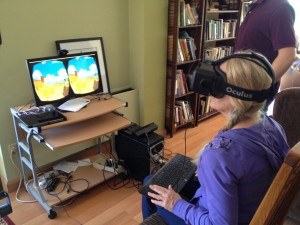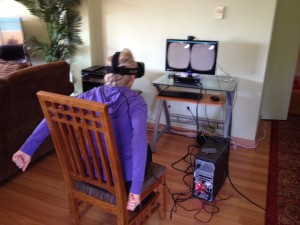What does a librarian do after working for 25 years in a beautiful school library? One cannot simply walk away from information literacy. The future of mankind depends upon it!
For nearly a decade, this blog has focused on the intersection of information literacy and global digital participatory culture (where students now live). Futurists, such as Thomas Frey, often make fascinating predictions; however, nobody really knows what libraries and digital culture will look like in ten years. One prediction is the rise in virtual reality tools like Oculus Rift, which I was able to experience this week thanks to my colleague from the University of Washington, Suzette Lewis and her talented computer programmer son, Matthew.
Suzette and Matthew are working on a research project in Oculus Rift to explore how 3D immersion with a headset and body motions differs from “flat computer screen” 3D worlds. I was invited, along with another graduate from the University of Washington’s Certificate in Virtual Worlds, to preview the project and found it simply amazing, although I was surprised the motion of movement in Oculus Rift made me dizzy! What!? I love roller coasters but his was totally different. Since I was motivated to master the movements, I was moving my arms wildly and found myself falling off a high platform into water. The graphics (created by Matthew in Unity) were amazingly realistic.
What does virtual reality have to do with information literacy and education? Consider how technology has impacted learning in the past five years. My school library was transformed from a primarily print-based environment to a digital world of iPads and apps in just two years. This rapid change is likely to continue in all areas of life- particularly social life as mobile devices continue to promise “connectivity” with our friends and family. Facebook has teamed up with Oculus Rift to make shared virtual events (concerts, a child’s birthday party, or anything one can imagine) possible. The educational potential might allow students to experience history, math, literature, art, or any other area of academics through virtual reality.
Having worked in virtual worlds for over 8 years, this concept is certainly not new to me. In fact, immersive learning experiences (such as the Anne Frank MOOC or the Summer in Berlin Simulation) are already possible in virtual worlds without a headset. The difference is the use of body movements rather than a keyboard and mouse. The potential for experiences of a variety of purposes is obvious; however, one might consider the actual concept of “reality”. What actually is reality? Is reality what is happening around us in the concrete world or what is happening within the mind?
Just as in the physical world, we have choices to make every day. Where do we want to spend our time and place our attention? What books do we want to read and what other media formats do we pursue? VR will bring more possibilities which will exemplify the personal responsibility required of digital citizens. Yes, it comes down to information literacy once again.

